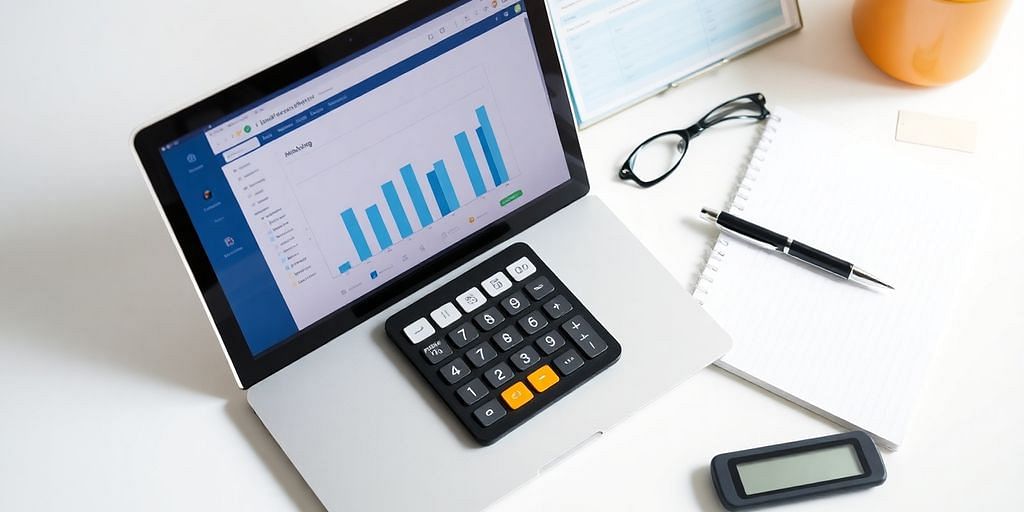
Mastering Learning Bookkeeping for Small Business: A Comprehensive Guide for Entrepreneurs
Back To BlogGetting Started With Bookkeeping Basics
Bookkeeping can seem scary when you're first starting a business. Trust us, we get it! But it's not something to put off. Getting a handle on the basics early on will save you a ton of headaches later. It's like building a house – you need a solid foundation, and for your business, that foundation is good bookkeeping. Let's break down some key things to know as you get started.
Understanding Financial Statements
Okay, so what even are financial statements? Think of them as reports that tell you how your business is doing. There are three main ones you'll want to get familiar with:
- Income Statement: This shows your revenue, expenses, and profit (or loss) over a period of time. It's like a snapshot of your business's performance.
- Balance Sheet: This gives you a picture of what your business owns (assets) and what it owes (liabilities) at a specific point in time. It also shows your equity, which is basically the value of your business if you paid off all your debts.
- Cash Flow Statement: This tracks the movement of cash in and out of your business. It's super important for understanding if you have enough cash on hand to pay your bills.
Learning to read these statements is like learning a new language, but it's a language that will help you make smarter decisions about your business.
The Importance of Accurate Record Keeping
Why is accurate record keeping so important? Well, for starters, it helps you make informed decisions. If you don't know where your money is going, how can you possibly plan for the future? Accurate records also make tax time way less stressful. Plus, if you ever need to get a loan or investment, lenders and investors will want to see your financial records. Think of it this way: accurate records are the backbone of a healthy business.
Here's a simple table to illustrate the benefits:
Common Bookkeeping Terms You Should Know
To get started, here are a few terms you'll hear a lot:
- Assets: What your business owns (cash, equipment, inventory, etc.).
- Liabilities: What your business owes to others (loans, accounts payable, etc.).
- Equity: The owner's stake in the business (assets minus liabilities).
- Revenue: The money your business earns from sales or services.
- Expenses: The costs your business incurs to generate revenue.
- Chart of Accounts: A list of all the accounts your business uses to track financial transactions. Understanding effective bookkeeping practices is key to success.
Tools and Software for Small Business Bookkeeping

Okay, so you're ready to ditch the shoebox full of receipts (we've all been there, right?). Let's talk about the tools that can make your bookkeeping life way easier. There are a ton of options out there, and finding the right fit can feel overwhelming. But don't worry, we'll break it down.
Choosing the Right Bookkeeping Software
Choosing the right software is like finding the perfect pair of jeans – it needs to fit just right. What works for a freelancer might not work for a small retail shop. Think about your business size, your budget, and your comfort level with tech. Some software is super intuitive, while others have a steeper learning curve. Consider what features are non-negotiable for you.
Here's a quick rundown of things to consider:
- Ease of Use: Can you figure it out without a finance degree?
- Scalability: Will it grow with your business, or will you need to switch later?
- Integration: Does it play nicely with your bank accounts and other tools you use?
Essential Features to Look For
Not all bookkeeping software is created equal. Some have all the bells and whistles, while others are more basic. Here are some features that are generally considered must-haves:
- Invoicing: Creating and sending professional invoices is key.
- Expense Tracking: Easily record and categorize your expenses.
- Bank Reconciliation: Matching your bank statements to your records is crucial for accuracy.
- Reporting: You need to be able to generate reports like profit and loss statements and balance sheets. Consider using QuickBooks Online for its reporting features.
Free vs. Paid Bookkeeping Tools
Ah, the age-old question: free or paid? Free tools can be a great starting point, especially when you're on a tight budget. However, they often come with limitations, like fewer features or limited support. Paid software usually offers more robust features, better support, and greater scalability. It really boils down to what you need and what you're willing to pay for. For example, QuickBooks Live offers online bookkeeping services for a fee.
It's worth spending a little extra for software that saves you time and headaches in the long run. Think of it as an investment in your business, not just an expense.
Here's a simple comparison:
Ultimately, the best way to decide is to try out a few different options. Most software offers free trials, so take advantage of those! And don't be afraid to ask for recommendations from other small business owners. We're all in this together!
Mastering Bookkeeping Techniques
Alright, let's get into the nitty-gritty of bookkeeping. It's not just about slapping numbers into a spreadsheet; it's about understanding how those numbers tell your business's story. We're going to break down some key techniques that will help you keep your books in tip-top shape.
Double-Entry vs. Single-Entry Bookkeeping
Okay, so there are two main ways to keep track of your finances: single-entry and double-entry. Single-entry is simpler – basically, you're just noting down income and expenses. Think of it like a checkbook register. It's easy to use, especially if you're just starting out. However, it doesn't give you a complete picture of your financial health.
Double-entry, on the other hand, is more complex but also more accurate. Every transaction affects at least two accounts. For example, if you buy supplies with cash, you're decreasing your cash account and increasing your supplies account. This method gives you a better view of your assets, liabilities, and equity. It also helps catch errors because the accounting equation (Assets = Liabilities + Equity) should always balance. For a more complete picture of your business's financial health, consider using double-entry bookkeeping.
How to Track Income and Expenses
Tracking income and expenses might seem obvious, but it's easy to let things slip through the cracks. Here's how we can stay on top of it:
- Separate Business and Personal Finances: This is huge. Don't mix your personal spending with business expenses. Open a separate bank account and credit card for your business.
- Record Everything: Every single transaction, no matter how small, needs to be recorded. Use bookkeeping software, a spreadsheet, or even a notebook – whatever works for you.
- Categorize Transactions: This is where the magic happens. Categorize each transaction (e.g., office supplies, marketing, rent). This will make it much easier to see where your money is going and coming from. Make sure you have a system for collecting and organizing receipts.
- Be Consistent: Set aside time each week (or even each day) to record your transactions. Don't wait until the last minute!
Tips for Reconciling Your Accounts
Reconciling your accounts is like making sure your bank statement and your books agree. It's a crucial step in ensuring accuracy and catching any errors or fraud. Here's how we do it:
- Gather Your Statements: Get your bank statements, credit card statements, and any other relevant financial statements.
- Compare Transactions: Go through each transaction on your statements and compare it to what you have recorded in your books. Look for any discrepancies.
- Investigate Discrepancies: If you find any differences, investigate them. It could be a simple data entry error, a missed transaction, or something more serious.
- Make Adjustments: Once you've identified the cause of the discrepancy, make the necessary adjustments to your books. This might involve adding a missing transaction, correcting an error, or contacting your bank to resolve an issue.
Reconciling your accounts regularly is a great way to catch errors early and prevent them from snowballing into bigger problems. It also gives you a better understanding of your cash flow and financial position.
Staying Compliant and Avoiding Mistakes

Bookkeeping isn't just about knowing where your money goes; it's also about staying on the right side of the law and avoiding costly errors. We've all heard horror stories about businesses getting into trouble because of poor bookkeeping. Let's make sure that doesn't happen to us!
Common Bookkeeping Mistakes to Avoid
Okay, let's be real – mistakes happen. But in bookkeeping, some mistakes are more common (and more painful) than others. Knowing what to look out for can save us a lot of headaches down the road. Here are a few big ones:
- Mixing business and personal expenses: This is a classic. It makes it super hard to get an accurate picture of your business's financial health, and it can cause problems with taxes. Keep those accounts separate!
- Not reconciling accounts regularly: Imagine not balancing your checkbook for months. Scary, right? Reconciling your accounts – comparing your records to your bank statements – helps catch errors and prevent fraud. Do it monthly, at least.
- Skipping depreciation: Forgetting to account for the depreciation of assets can skew your financial statements and affect your taxes. Make sure you're tracking those assets and their depreciation schedules.
One of the most important things we can do is to double-check our work. It sounds simple, but it's easy to get complacent and miss something. A fresh pair of eyes can catch errors we might overlook.
Understanding Tax Obligations
Taxes. The word alone can make anyone's heart sink. But as business owners, we can't avoid them. Understanding our tax obligations is a must. This means knowing which taxes we need to pay (income tax, self-employment tax, sales tax, etc.), when they're due, and how to file them. It's a lot, I know. Here's a quick rundown:
- Income Tax: Based on your business profits.
- Self-Employment Tax: If you're self-employed, you pay this instead of Social Security and Medicare taxes.
- Sales Tax: If you sell products or services, you likely need to collect sales tax from your customers and remit it to the state.
It's also a good idea to keep up with changes in tax laws. They can change every year, and what was true last year might not be true this year. Consider using bookkeeping software to help you stay organized.
When to Hire a Professional Bookkeeper
Sometimes, despite our best efforts, bookkeeping can feel overwhelming. That's when it might be time to bring in a pro. A professional bookkeeper can help us with everything from setting up our accounting system to preparing our taxes. Here are some signs it might be time to hire one:
- We're spending too much time on bookkeeping and not enough time on running our business.
- We're not confident in our ability to keep accurate records.
- We're facing complex financial situations (like raising capital or dealing with audits).
Think of it as an investment in our business. A good bookkeeper can save us time, money, and stress in the long run. Plus, they can provide valuable insights into our business's financial performance. It's all about finding the right balance between doing it ourselves and getting help when we need it.
To keep your business on the right track and avoid costly errors, it’s important to stay updated on the rules and regulations that apply to you. Make sure you understand what is required and take the necessary steps to follow these guidelines. For more tips and resources, visit our website today!
Frequently Asked Questions
What is bookkeeping and why is it important for small businesses?
Bookkeeping is the process of recording all the money your business makes and spends. It's important because it helps you understand your financial situation, keep track of expenses, and prepare for taxes.
Do I need special software for bookkeeping?
While you can do bookkeeping with just a notebook and pen, using software can make it much easier. There are many options available, both free and paid, that can help you manage your finances better.
When should I consider hiring a professional bookkeeper?
If your business is growing and your finances are getting too complicated, it might be time to hire a professional. They can help you stay organized and ensure everything is accurate.
